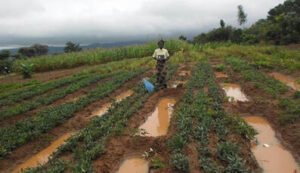Israel closes 88% of cases of alleged war crimes or abuse without charges – report – theguardian.com

Report on Military Investigations in Gaza and the West Bank and Their Implications for Sustainable Development Goals
Executive Summary
An analysis by the conflict monitor Action on Armed Violence (AOAV) of Israeli military investigations into alleged misconduct by its forces reveals significant challenges to accountability and justice. The findings indicate that nearly nine out of ten investigations initiated since the conflict began have been closed without finding fault or remain unresolved. This pattern has profound implications for the United Nations Sustainable Development Goals (SDGs), particularly SDG 16 (Peace, Justice and Strong Institutions), as well as goals related to hunger, health, and sustainable communities.
Analysis of Investigation Outcomes
The AOAV report reviewed 52 publicly reported cases where the Israeli military initiated investigations into allegations of civilian harm or wrongdoing in Gaza and the West Bank between October 2023 and June 2025. These incidents resulted in 1,303 Palestinian deaths and 1,880 injuries.
Breakdown of Case Statuses:
- Unresolved or Under Review: 39 cases (75%)
- Closed with No Fault Found: 7 cases (13.5%)
- Violations Found: 5 cases (9.6%)
- Criminal Conviction: 1 case (1.9%)
The data shows that 46 of the 52 cases (88%) have not resulted in a finding of fault against Israeli forces, creating what researchers describe as a potential “pattern of impunity.”
Impact on SDG 16: Peace, Justice and Strong Institutions
The low rate of resolution and accountability directly undermines the core tenets of SDG 16, which aims to promote peaceful and inclusive societies, provide access to justice for all, and build effective, accountable, and inclusive institutions.
- SDG 16.3 (Promote the rule of law and ensure equal access to justice): The large number of unresolved cases, including high-profile incidents, denies victims and their families access to justice and legal recourse.
- SDG 16.6 (Develop effective, accountable and transparent institutions): The slow and opaque nature of the investigation process, as reported by critics, raises questions about the effectiveness and transparency of the Israeli Defense Forces’ (IDF) internal accountability mechanisms, such as the Fact-Finding Assessment (FFA) mechanism.
Key Unresolved Incidents Undermining SDG 16:
- The killing of at least 112 Palestinians queuing for flour in February 2024.
- A deadly airstrike on a tented camp in Rafah that killed 45 people in May 2024.
- The killing of 31 Palestinians at a food distribution point in Rafah in June 2024.
Implications for Broader Humanitarian and Development Goals
The nature of the incidents under review also demonstrates severe setbacks for other critical SDGs.
- SDG 2 (Zero Hunger): Multiple attacks on civilians seeking food aid directly threaten food security and disrupt humanitarian efforts to combat hunger. The killing of seven aid workers from World Central Kitchen further cripples the delivery of essential food supplies.
- SDG 3 (Good Health and Well-being): The significant number of civilian casualties (1,303 killed, 1,880 wounded) in the analyzed incidents represents a grave failure to protect human life and well-being.
- SDG 11 (Sustainable Cities and Communities): Attacks on civilian infrastructure, including a tented camp designated for displaced persons, compromise the goal of making human settlements safe, resilient, and sustainable.
Official Position and Process
The IDF maintains that it conducts examination and investigation processes for exceptional incidents in accordance with Israeli and international law. It utilizes a two-tiered system involving the FFA mechanism and, when warranted, criminal investigations by the Military Advocate General. The IDF reported in August 2024 that it had launched 74 criminal investigations related to the war in Gaza, covering incidents of detainee mistreatment, theft, and illegal use of force. However, these figures and methodologies differ from the case-tracking conducted by AOAV.
Analysis of Sustainable Development Goals (SDGs) in the Article
1. Which SDGs are addressed or connected to the issues highlighted in the article?
-
SDG 16: Peace, Justice and Strong Institutions
This is the most relevant SDG. The article’s core focus is on the failure of military investigation and justice systems to address alleged war crimes, the lack of accountability for civilian deaths, and the “pattern of impunity.” It directly discusses violence, death rates, the rule of law, and the effectiveness and transparency of institutions (specifically, the Israeli military’s investigative bodies).
-
SDG 2: Zero Hunger
This SDG is connected through specific incidents mentioned in the article where civilians were killed while trying to access food. The text highlights the killing of “at least 112 Palestinians queueing for flour” and another “31 Palestinians going to pick up food at a distribution point.” These events underscore the lethal risks associated with food insecurity and the breakdown of safe access to essential supplies in a conflict zone.
2. What specific targets under those SDGs can be identified based on the article’s content?
-
Target 16.1: Significantly reduce all forms of violence and related death rates everywhere.
The article directly relates to this target by reporting on the deaths of 1,303 Palestinians and the wounding of 1,880 in the 52 incidents investigated by Action on Armed Violence (AOAV). It details specific violent events, such as airstrikes on a tent camp and shootings at food distribution points, which contribute to the conflict’s death rate.
-
Target 16.3: Promote the rule of law at the national and international levels and ensure equal access to justice for all.
This target is central to the article’s analysis. The report by AOAV suggests a failure in the rule of law, stating that nearly “nine out of 10 Israeli military investigations… have been closed without finding fault or left without resolution.” The low number of concluded cases and prosecutions (one prison sentence mentioned from 52 recent cases, and one known prosecution from 664 historical inquiries) points to a lack of equal access to justice for Palestinian victims.
-
Target 16.6: Develop effective, accountable and transparent institutions at all levels.
The article questions the effectiveness, accountability, and transparency of the IDF’s internal investigative bodies, such as the Fact-Finding Assessment (FFA) mechanism and the Military Advocate General’s office. These institutions are described as “opaque and slow-moving,” and their investigations are criticized for creating a “pattern of impunity.” The World Central Kitchen charity’s view that the IDF’s investigation into the killing of its aid workers “lacked credibility” further supports the relevance of this target.
-
Target 2.1: By 2030, end hunger and ensure access by all people… to safe, nutritious and sufficient food all year round.
The article connects to this target by illustrating a severe impediment to safe access to food. The killing of civilians while they were “queueing for flour” or at a “food distribution point” demonstrates that access to food is not only insufficient but also life-threatening, directly undermining the goal of ensuring safe access to food for vulnerable populations.
3. Are there any indicators mentioned or implied in the article that can be used to measure progress towards the identified targets?
- Conflict-related deaths and injuries: The article provides specific numbers that can serve as indicators for Target 16.1. It states that the 52 cases reviewed by AOAV “involve the deaths of 1,303 Palestinians and the wounding of 1,880.” These figures are direct measures of conflict-related violence.
-
Investigation and justice outcomes: The article provides several statistics that act as indicators for the effectiveness of the justice system (Target 16.3).
- The proportion of unresolved investigations: “46 [out of 52] cases, representing 88% of the total… seven were closed without any finding of fault… A further 39 remain under review.” This 88% figure is a powerful indicator of a lack of resolution and accountability.
- The number of prosecutions and convictions: The article mentions only “one case resulted in a prison sentence for an Israeli soldier” out of the 52 recent incidents. It also cites a historical figure from the Yesh Din human rights group of “one known prosecution after 664 inquiries” from previous operations, indicating a very low rate of judicial accountability.
- Institutional effectiveness and transparency: The critique of the IDF’s investigative mechanisms as “opaque and slow-moving” and the fact that the FFA investigations “can take years” are qualitative indicators of institutional ineffectiveness (Target 16.6). The IDF’s own statistic that it has launched “74 criminal investigations” can be compared against the number of civilian casualty incidents to measure the institutional response.
- Barriers to safe food access: The specific events mentioned—the killing of 112 people queuing for flour and 31 at a food distribution point—serve as stark, qualitative indicators of the failure to ensure safe access to food (Target 2.1). They represent critical failures in protecting civilians seeking life-sustaining aid.
4. Summary Table of SDGs, Targets, and Indicators
| SDGs | Targets | Indicators Identified in the Article |
|---|---|---|
| SDG 16: Peace, Justice and Strong Institutions |
16.1: Significantly reduce all forms of violence and related death rates everywhere.
16.3: Promote the rule of law… and ensure equal access to justice for all. 16.6: Develop effective, accountable and transparent institutions at all levels. |
– Number of deaths (1,303) and wounded (1,880) in 52 reported incidents. – Specific incidents of deadly violence (airstrike on a tent camp, shootings at aid queues). – Proportion of investigations closed without fault or left unresolved (46 out of 52, or 88%). – Descriptions of investigative bodies as “opaque and slow-moving.” |
| SDG 2: Zero Hunger | 2.1: End hunger and ensure access by all people… to safe… food all year round. |
– Number of civilians killed while trying to access food aid (e.g., “at least 112 Palestinians queueing for flour,” “31 Palestinians going to pick up food”). – Reports of military forces opening fire on people at food distribution points, indicating a severe lack of safe access. |
Source: theguardian.com

What is Your Reaction?
 Like
0
Like
0
 Dislike
0
Dislike
0
 Love
0
Love
0
 Funny
0
Funny
0
 Angry
0
Angry
0
 Sad
0
Sad
0
 Wow
0
Wow
0













































































